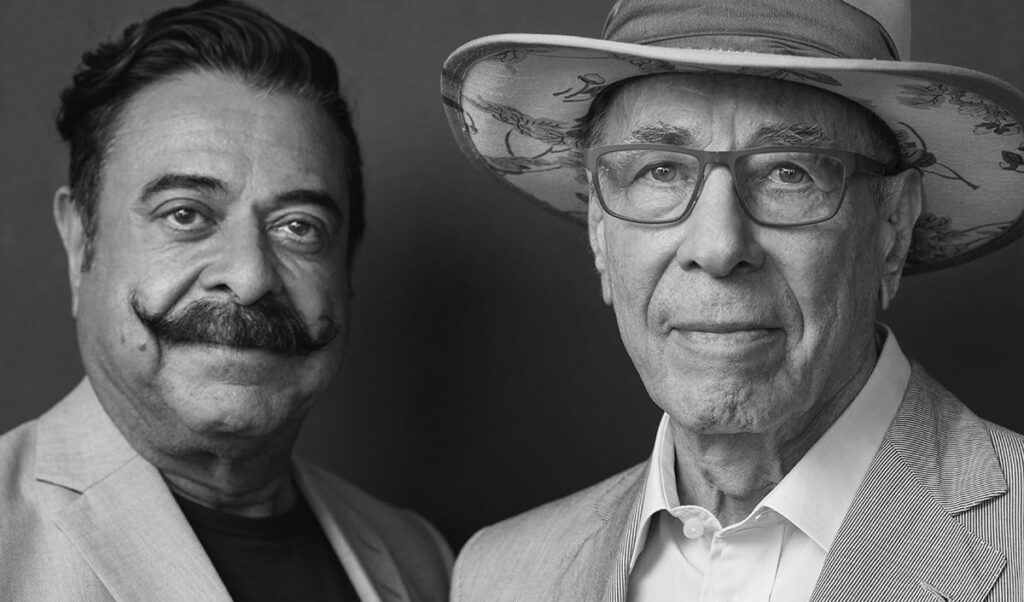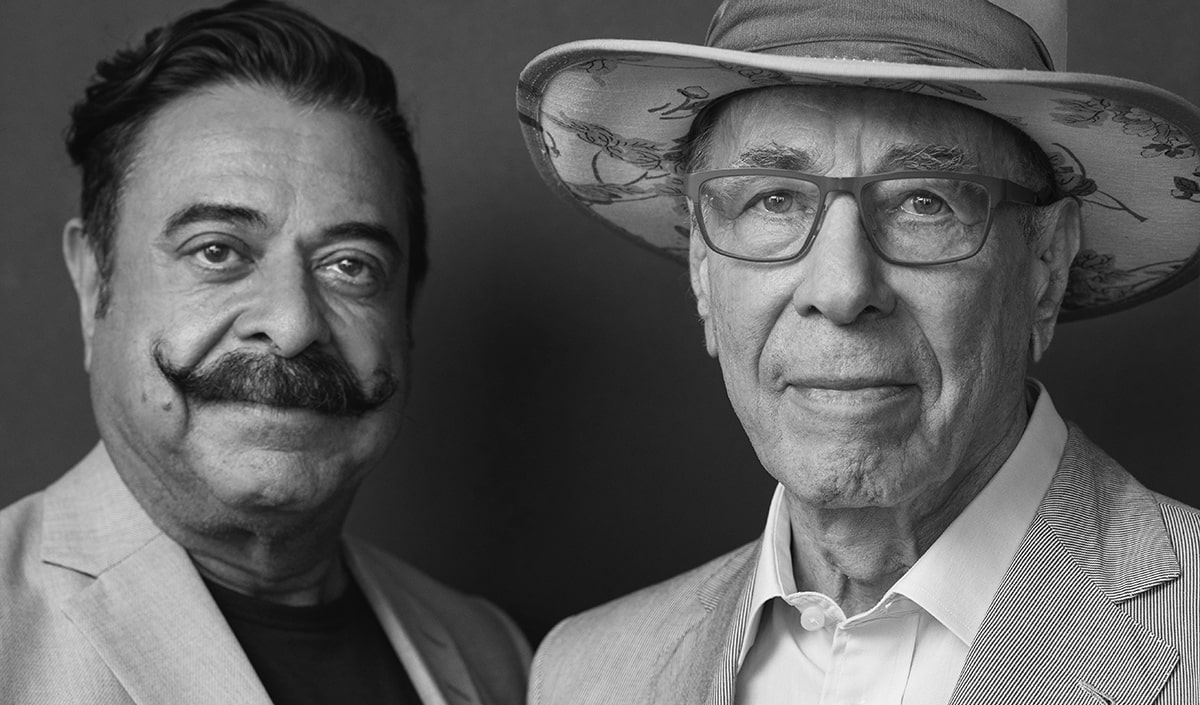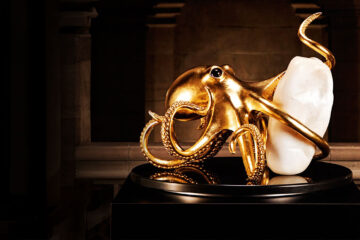Isadore Sharp & Shahid Khan: Double Vision
Growing up in completely different environments thousands of kilometres apart didn’t prevent Isadore Sharp and Shahid Khan from coming together with a shared vision for business success.
On the surface, given their upbringings, it’s hard to imagine these two men ever meeting, let alone entering into business together. But one of the joys of life is doing a little sleuthing and digging deeper for the story behind the story, uncovering that inexplicable serendipity that makes things happen and brings people from the far corners of the world together.
Isadore Sharp grew up in Toronto, Canada, and is the founder and chairman of the luxury Four Seasons Hotels brand. He has become a legend in the hospitality business, where his name is globally revered. Shahid Khan grew up in Lahore, Pakistan, immigrated to America as a teenager with $500 in his pocket and today owns one of the world’s largest original equipment manufacturers in the automotive industry, two professional sports franchises as well as All Elite Wrestling as well as the flagship Four Seasons property in Toronto, the company’s headquarters city.
When Dolce recently interviewed both gentlemen, what struck us most was what they have in common in terms of their personalities and experiences despite their vastly different origins and upbringings.
Both are innovators and visionary businessmen, able to see things that others before them have not. Both had parents who instilled in them a strong ethic of hard work, honesty and sense of self. Both took chances early in their business careers, and because of their insights and acumen and by seeing challenges as opportunities, those chances they took made them leaders in their fields. And both have the enduring support of strong and loving wives and the unshakable foundation of family.
And though the business fates did not bring them together until 2016, when Khan purchased the Four Seasons Hotel in Toronto’s Yorkville, they immediately found themselves members of a mutual admiration society, full of respect for each other not only as successful businessmen but also as human beings.
“Shahid is a remarkable individual, so humble, and in terms of our ability to work together on a scale of one to ten, he’s an 11,” says Sharp. “He is always so supportive and knows how to do the right thing and understand the important people who work for him. For the hotel’s 10th anniversary, he created a magnificent evening and celebration of their successful hotel. As an owner, he is on top of the list. He came to this country with absolutely nothing as a young teenager and went on to build this empire, yet he has never lost a sense of what it’s like when you’re trying to build a company, so it’s been one of those rare experiences to share with somebody.”
“I went through the purchasing process for the Four Seasons Yorkville and then I got to meet Issy, and I’m just absolutely a huge fan,” says Khan. “And, you know, he’s an architect and has a great eye for great design. I was blown away by all of the amenities here. I mean, have you seen the cafeterias and the amenities for the employees here? It’s mind-blowing and better, I have to say, than most of the guest spaces in the rest of Toronto’s hotels. Issy had his fingers on every little detail of this place, so how he’s done that is unbelievably remarkable. He’s a big sports fan, too — he’d watched the last couple of Jaguars games and his insights were spot-on. I’m saying, ‘Issy, why didn’t you tell me this five years ago?’ I mean, it took me five years to figure this thing out, what’s important to athletes and how you talk to them as human beings.
Issy is just so super-perceptive. He’s an icon not only for the Four Seasons, but just as a human being.”
As testament to their characters as superlative human beings, both men have used their business success through their generous philanthropic efforts to give back to the communities, worthwhile causes and charities that are important to them.
Sharp founded the now-global Terry Fox Run after meeting Fox during his famous 1980 run to raise funds for cancer research, and he is still a director of the Terry Fox Foundation. He and his wife, Rosalie, also support Toronto’s Mount Sinai Hospital and the Hebrew University of Jerusalem and are the main benefactors raising funds to build a Jewish Museum of Canada in Toronto. “There is a Jewish word, ‘tzedakah,’ which means ‘giving back,’ and I’m proud that my good fortune [lets me] give back not only to the Jewish community, but also to those who need help,” says Sharp.
Khan and his wife, Ann, have been philanthropists in their community for decades, particularly for the University of Illinois at Urbana-Champaign, where both graduated. The couple just last year made a gift of US$15 million that will transform the integrated oncology program at the University of Illinois Veterinary Teaching Hospital. “One of the great joys of my life is making money. What makes it even better is to use it to make a difference,” says Khan.
A dedicated commitment to helping others, a shared vision of how to build, maintain and grow world-respected international businesses and an appreciation for the love of family and friends — it turns out that Toronto and Lahore aren’t so different after all.
NO COMPLAINTS
From his humble beginnings to founding and growing one of the world’s most iconic luxury hotel brands, Isadore Sharp, who has never had time for complaints, set out to ensure that complaints would never be a part of a guest’s experience at Four Seasons Hotels.
Decades ago, traditional department stores had a tiny open-window wicket tucked off in a corner with a sign above it that read “Complaints.” It was where a customer could register a complaint with a store representative about a product, a return, a price or even a salesperson and was a one-on-one experience, a personal, private and quiet conversation.
Today, social media can sometimes seem to have become a global complaint wicket about too many things to mention. Complaining has become a loud international pastime where anyone with a smartphone can climb onto the mountaintop, click and scream to everyone about anything or anyone.
It’s a far cry from the youthful experiences of Isadore (Issy) Sharp, founder and chairman of Four Seasons Hotels and Resorts. In his world, “Do your job” and “get on with it” were the hard-work philosophies his Polish Jewish immigrant parents instilled in him and his three sisters growing up in Toronto. There was no complaining.
“My parents were very hard-working, very principled and so appreciative of the opportunities ahead of them,” Sharp tells Dolce in a recent interview. “They never complained. We were so thankful to have a job whatever poor conditions there were. There was never a complaint at any time. When you grow up in that type of atmosphere it develops who you are. You learn by experience, so we were fortunate. My sisters and I were given freedom and we were never told what to do. We had to be home for dinner and in time for bed,” that was all.
Before graduating with a degree in architectural technology from Ryerson Institute of Technology (now Toronto Metropolitan University), Sharp worked as a construction labourer during the summers with his father, who was in the home- renovation business and often renovated and then resold homes as a real estate investor. That experience taught Sharp important life and work lessons.
“Whether it’s cold during the winter or hot in the summer, you gain an understanding of what your obligations are when you’re working,” recalls Sharp. “You have to toughen up and do your job. I think that work experience as a young man set me up for dealing with people.”
One of those people was his friend Jack Gould, who asked Sharp to build him a motel on the outskirts of Toronto that Gould and his wife would run. Following his graduation from Ryerson, Sharp had gone to work full-time as an architect and real estate developer for his father’s company, building apartment buildings and houses. But it was something about his friend’s request to build a 22-unit motel that gave Sharp the kernel of an idea.
“I wasn’t thinking of going into the hospitality business, but I was surprised by his success, and I thought that if it worked there in the middle of nowhere, with no access to a highway, that idea would work better downtown,” he says. “So that gave me the spark of an idea which led me on a five-year journey of convincing other people that it might work.”
To say that Four Seasons Hotels and Resorts, which now operates more than 125 properties in 47 countries and 50 residences, had a modest start is a bit of an understatement. After five years of persistence against much skepticism, Sharp founded the company and opened his first property, the Four Seasons Motor Hotel, on Jarvis Street on the east side of downtown Toronto. The neighbourhood was not glamorous — in fact, it was notorious as an area where the only people walking the streets at night were those engaged in the world’s oldest profession.
Somehow Sharp made it work, bringing a level of style and sophistication to a city desperately seeking it. Toronto in the early 1960s was a rather drab provincial backwater of 600,000, not the major cosmopolitan centre of six million- plus people that the Greater Toronto Area is today. On a Sunday 60 years ago in Toronto you couldn’t purchase liquor, nor were any sports events permitted. To put it in perspective, the most exciting thing about living in Toronto in 1961 was that you were only a two-hour drive from the glitz and glamour of Buffalo.
Sharp brought something different to Toronto’s hospitality business, a dedication and commitment to customer service. “The first principle of opening the first hotel, as I told our general manager, is that we want to treat the people that come into the hotel just like we’d treat guests coming to our house for dinner,” he says. “We’re the host, they’re our guests — let’s make sure that they feel welcome.”
Sharp discovered he had a knack for the hospitality business, later opening the $4 million Inn on the Park hotel in suburban Toronto — which, it should be pointed out, contained Canada’s first discotheque and was exceptionally groovy.
Every business needs a USP — a unique selling proposition, something that sets it apart from all the other businesses also making widgets. Influenced perhaps by his upbringing, work ethic or his own kind and caring nature, Sharp quickly determined what would set the Four Seasons apart when he realized hospitality was going to be his career.
“I decided early on that we were going to make the quality of our service our distinguishing feature,” he recalls. “If we were going to compete, we had to have something that was sustainable and that we could always rely on. Because service is an intangible, we set out to make it better than other companies, and in order to do that we were going to have a workforce who were going to deliver on that product.”
“IT’S THE GOLDEN RULE — THE SIMPLE IDEA THAT IF YOU TREAT PEOPLE WELL, THE WAY YOU WOULD LIKE TO BE TREATED, THEY WILL DO THE SAME.”
— Isadore Sharp
In addition to a Four Seasons hotel or resort’s unparalleled luxury, quality, finishings, amenities, locations and beauty, its people really do make the difference. Staff are welcoming, helpful, knowledgeable, courteous and extremely professional. These are people who have made hospitality their career, are happy in their work and are proud to have climbed to the top of their profession by being employed by Four Seasons.
“You can go anywhere in the world and stay at a Four Seasons,” says Sharp, expressing pride in his employees. “We can take people from that community, who have the same work ethic and principles that we believe are important, and they rise to the occasion. Do you know anybody who wants to work and wants to fail? It’s innate, we all want to do our best. The thing we can do is to create a work environment that lets people rise to their best selves. We’ve all got our own talent and not everybody is going to become a leader, but everybody can reach their best levels. Then you get a very good team — and over 60 years, it’s never failed.”
The employees also subscribe to the company’s philosophy of service, which Sharp states prominently on the company’s website: “The reason for our success is no secret. It comes down to one single principle that transcends time and geography, religion and culture. It’s the Golden Rule — the simple idea that if you treat people well, the way you would like to be treated, they will do the same.”
“We had to give our employees the tools they needed for their job and that’s where the Golden Rule came into being,” explains Sharp. “To treat other people in a manner we expect them to treat guests. All these things built onto the idea and that has become the bedrock of the culture of the company.”
Large hotels can often be cold, impersonal places, with huge front desks, banks and banks of elevators and a minimal amount of lobby furniture to discourage loitering. Not so at a Four Seasons, where you are greeted by stunning floral displays and deep plush upholstery. Whether it’s a commanding presence in the centre of a major world city or a lobby open to ocean breezes, there is a palpable sense of calm, serenity, style and sophistication in the welcoming oases that call themselves Four Seasons properties. You simply have no complaints when you stay at a Four Seasons. It’s that distinctive difference that Sharp has brought to the industry as one of its most respected and recognized hoteliers and as one of its foremost innovators.
“We were the first company to put shampoo in the bathroom,” Sharp says proudly. “Because I grew up with three sisters, I knew that girls never wash their hair with soap. And then there were the larger shower heads, the large cotton towels, the large bars of soap, the two telephones — one in the bathroom and one beside the bed. It was always about touch and feel because I figured that whatever a customer was going to use, if you could make an impression by what that product was, that would be noticeable. One of the things we did very early on was to use very, very good toilet paper. So it was just that concept of giving people something that might be useful and memorable. That innovation has gone on from day one to this day. We’re continuing to think about the customer and what their needs are.”
While the Golden Rule may be the bedrock of his company, the bedrock of his life has been his wife of almost 70 years, Rosalie, his high school sweetheart. They met at a wedding and after a few dances and conversations were instantly smitten with each other. Together they had four sons. Sadly, their third son, Christopher, died of melanoma in 1978, at 18.
Chris’s passing at least partly inspired Sharp to support the legendary Terry Fox on his famous run across Canada in 1980 to raise funds for cancer research. Sharp first met Fox when the latter was passing through Toronto on his run in June of 1980. Sharp invited Fox to stay at one of the city’s Four Seasons Hotels on his run. He also helped pay for Fox’s cancer treatment and later pledged to contribute money on his behalf for research, and helped start the now-international Terry Fox Run, which has raised $850 million towards cancer research, and he still serves on its board of directors.
Issy and Rosalie Sharp are two of Canada’s most prominent and generous philanthropists, supporting not just the Terry Fox Foundation but also the Four Seasons Centre for the Performing Arts, the Ontario College of Art and Design, Mount Sinai Hospital and the Hebrew University of Jerusalem. The Sharps are also spearheading a proposal to build a Jewish Museum of Canada in Toronto, pledging $20 million towards its fundraising goal of $150 million.
“Our tradition is to share our good fortune and to give back to the community,” says Sharp, explaining his and Rosalie’s philanthropic endeavours. “I’m fortunate to have been successful enough to share our good fortune and it’s a privilege. It’s been a part of our lives and a lot of times it’s not about the money — it’s about the time you give in helping people.”
Isadore Sharp has done a lot of giving back over the years both personally and professionally by donating his own money and time to help others and by building one of the truly great global luxury hospitality brands. “It’s nice to be able to say that we have a global brand name that is ahead of the industry, in terms of quality of the hotel and continuing to preserve that mission, and the brand now has a life of its own. I believe in the year 2060 Four Seasons will celebrate its 100th anniversary as the undisputed leader in luxury hospitality,” says Sharp.
In the meantime, we should all enjoy the experience. So put down your phone, look up, and revel in the luxurious environment Isadore Sharp and Four Seasons has created for you. Then wrap yourself in a large towel, flop onto a heavenly bed, enjoy unparalleled guest services, amenities and food. You’ve got nothing to complain about — not if Isadore Sharp and his personal and professional life experiences have anything to say about it.
BUILDING ON LEGACY
Shahid Khan, one of the world’s most successful self-made businessmen, fully appreciates the legacy when he bought Toronto’s flagship Four Seasons Hotel.
Shahid Khan’s class of accommodations has, shall we say, evolved over the years. On his first night in the U.S., where he’d come to study at the University of Illinois Urbana–Champaign, his introduction to the country came during a historic blizzard that shut down the campus, redirecting him to a $2-a-night room at the YMCA. He had left his native Lahore, Pakistan, with the $500 his father had given him. So that left him with $498, though he helped make ends meet the next day by accepting a dishwashing job that paid $1.20 per hour.
In 2011, Khan purchased the National Football League Jacksonville Jaguars for a reported US$770 million. In 2013 he bought the London soccer club Fulham F.C. of the English Premier League for a reported £200 million and in 2016 the flagship Four Seasons Hotel and Residences in Toronto’s Yorkville neighbourhood for $225 million.
There have been many “self-made-man” stories over the decades but perhaps none as inspiring as that of Shahid Khan, the very personification of the American Dream. That’s what Forbes magazine called him when he graced its front cover in 2012 as “The New Face of the American Dream,” and was recognized by the same magazine several years later as one of the world’s greatest living business minds.
I think we can all agree he did a very nice job with that initial $500.
Khan succeeded because of the hard-work ethic demonstrated by his father and mother in an environment, the Pakistan of those years, that did not welcome change, innovation or new ways of thinking.
“I could spend hours talking about the impediments and the closed-mindedness to new ideas, the status quo being maintained so the rich get richer, and the poor get poorer,” says Khan in a recent interview with Dolce. “A lot of the values we have here in Canada and the United States, they don’t exist [in Pakistan], so there isn’t equal opportunity — in fact, it’s quite the opposite. Canada is an immigrant country, so is America. You come here to achieve your potential and there are no barriers to it other than yourself. In other parts of the world there is every barrier you can imagine — cultural, social and political.”
In those early days at his American university, he decided to join the school’s Beta Theta Pi fraternity, and it turned out to be one of the key decisions of his life.
“That’s one of the greatest things that happened to be because being from Pakistan, in order for me to have success, I needed to assimilate,” recalls Khan. “Becoming a part of Beta was one of the greatest fundamental and foundational things that has happened to me to this day. It gave me self- confidence and recognition because at a university you’re basically known by what fraternity you’re in, and networking, which is an absolutely critical part. And then, obviously, the social aspect of meeting girls at sororities and meeting girls going to bars. That’s the ultimate cold-calling — if you can learn to sell yourself in that environment, selling auto parts becomes pretty easy.”
Khan mentions auto parts because of the time he spent working at the automotive manufacturing company Flex-N-Gate Corporation while attending university. When he graduated with his B.Sc. in Industrial Engineering in 1971, he was hired by the company as its engineering director. Ever the entrepreneur, he used $16,000 of his own savings and a $50,000 loan from the U.S.’s Small Business Administration in 1978 to form Bumper Works, which made car bumpers for customized pickup trucks and body-shop repairs.
In 1980 Khan bought Flex-N-Gate and brought Bumper Works into the fold. He rapidly grew the company, and soon it was supplying bumpers for the Big Three automakers. Since then, the company’s sales have grown from $17 million to an estimated $8.9 billion in 2020. Automotive News currently ranks Flex-N-Gate as the seventh largest original equipment supplier in North America, the 45th largest supplier in Europe and the 31st largest supplier globally. Flex-N-Gate employs nearly 26,000 people at 74 manufacturing facilities and five advanced product-development centres throughout the United States, Canada, China, Mexico, Argentina, Brazil, Germany, France and Spain.
Despite his success, Khan says he maintains the same perspective he did when arriving in Illinois with $500 in his pocket. “I think I absolutely do because money should not change your values, in a good way or a bad way. Hard work, openness, perseverance and authenticity prevail and that applies today just as much as it did 50 years ago,” he observes.
The foundation of Khan’s life is his wife, Ann, whom he met in a bar at the University of Illinois and dated for 10 years before they married in 1977. To use Khan’s own analogy, a very successful cold-calling exercise, indeed!
“I never ever thought it would amount to anything other than, you know, a fling,” laughs Khan. “But it worked, it worked out great — and, as she’ll tell you, it worked out great for me! Even all these years later, people will ask her what if she had never met me and she has a pet answer, ‘Well, then I’d meet someone else richer!’”
Shahid and Ann’s pride and joy are their son, Tony, and their daughter, Shanna. Khan knows the importance of instilling in them both the self- confidence they’ll need to find their own way in their respective fields of interest.
“You know, there is something about parenting — we want our kids to appreciate where we came from, but then if we hold them to the standards we grew up with, we’re setting them up for failure,” says Khan. “I think they need a sense of self-worth. They need a sense of satisfaction and accomplishment. After college, I think that’s the important thing, to set them up for success in life,” says Khan, the company’s lead investor. “He observed and identified that this business was ready for disruption. Now, after only three years, it’s the number one show on cable on Wednesday nights. I’m really proud of him for developing a highly successful business.”
“YOU WANT TO MAKE A DIFFERENCE AND DO IT IN A MEANINGFUL WAY.”
— Shahid Khan
The last decade has seen the dapper Khan, known for his distinctive moustache, emerge as one of the world’s leading sports tycoons, purchasing both the National Football League’s Jacksonville Jaguars and the English Premier League’s Fulham soccer club. With these ownerships comes a new kind of spotlight because you can’t hide in professional sports, especially with its passionate fan bases — all of whom have their opinions (and all of which are correct, mind you).
“The most surprising thing about having an NFL team and an EPL team is the notoriety,” says Khan. “One thing you’ll learn about sports is that it is very humbling, because everyone is going to know more about it than you do. In sports, everyone’s got an opinion and they’re smarter than you are. And that’s the fun part of sport, but any anonymity is gone.”
Given his background, upbringing and vast international experience, Khan is a keen observer of life, and he observes some similarities between the world of big business and the world of professional sports. In Khan’s eye, it comes down to that magic measuring stick: performance.
“Sports is really about performance on the pitch or the gridiron, depending on the type of football,” he says. “So, whether you are big or small or tall, fast or slow, your performance — what you do —really defines you. It’s not the colour of your skin. I mean, it’s a great equalizer.”
Admittedly, the Jacksonville Jaguars are not the NFL’s most prominent franchise, lacking both the history and winning pedigree of, say, the Green Bay Packers or Dallas Cowboys. They have made two championship-game appearances since entering the league in 1995 but are only one of four teams to never have played in a Super Bowl. (For those scoring at home, the others are the Detroit Lions, Cleveland Browns and Houston Texans.)
But things are changing for the better. The team now has that “holy trinity” it takes to win in the NFL: Khan’s solid ownership, a proven head coach in the Super-Bowl-winning Doug Pederson, and one of the games’ most exciting young quarterbacks, Trevor Lawrence. So, keep your eye on the Jacksonville Jaguars.
Khan had an intimate knowledge of Toronto before purchasing the Four Seasons Hotel and Residences, the flagship hotel of the international luxury hospitality brand in the middle of its headquarters city. As a Commonwealth country, Canada had many Pakistani families immigrate here instead of to the United States, and Khan’s family often visited relatives who lived in Toronto.
His knowledge of the city only grew through his many business trips to his auto-parts manufacturing facilities located in outlying areas of the city, including Mississauga, Oshawa and Scarborough. For his overnights, however, Khan preferred to stay in Yorkville, the midtown neighbourhood of trendy cafés, restaurants, bistros and fine hotels, including the original Four Seasons Hotel on Avenue Road just north of Bloor Street, the city’s main shopping thoroughfare.
However, due to the popularity of the Four Seasons and of Yorkville itself, then home to many Toronto International Film Festival (TIFF) events, the hotel was often booked solid, forcing Khan to seek other neighbourhood accommodations. Sometimes, you can have all the money in the world (or at least, a great deal of it) but you simply can’t get a room.
Then Khan read that the new Four Seasons Hotel and Residences, just blocks away from the original, was for sale. “I said, ‘Oh geez, if I could just get that, I’m not going to have to worry about getting a room,’” says Khan, smiling. “Whenever I’m coming in, they can’t tell me, ‘There’s a big conference,’ or ‘TIFF is in town,’ or whatever. It’s like, ‘Well then, just kick someone out!’”
Khan well understood the importance of what he was purchasing, given the landmark status of the flagship Four Seasons Hotel and the legacy Isadore and Rosalie Sharp had created with their hotels. “Meeting Issy and Rosalie has been a real joy because he is one of the most interesting people you’re going to meet, and this is like sacred ground in a way,” says Khan, referring to the 55-storey tower at Bay Street and Yorkville Avenue. “They were asking me ‘You’ve never owned a hotel or anything?’ and I told them the founder lives 10 minutes from here and the corporate offices are another few minutes from here and there’s no way I can screw it up because this is their legacy. They’re not going to let us screw it up.”
Khan’s phenomenal business success has allowed him and Ann to devote millions of dollars to their philanthropic efforts, helping many worthwhile causes and charities. For both of them, making a difference is just the right thing to do.
“You want to make a difference and do it in a meaningful way,” says Khan. “I don’t think money is the be-all and end-all — yes, you’re comfortable, and having more is a great way of measuring it — but unless it’s put to work, money sitting in a bank account doesn’t do any good at all.”
Shahid Khan has come a long way from that $2-per-night YMCA room, to building one of his industry’s most successful companies, to spending more than $1 billion on two professional sports franchises, to purchasing the flagship hotel of one of the world’s most iconic luxury brands, to donating millions to worthwhile charities and causes.
It’s amazing to think how far $500 can take a person.
Toronto, Canada, and Lahore, Pakistan, are separated by 11,233 kilometres, and that’s just the geographic distance. The cities might as well be worlds apart when you consider the vast differences in culture, traditions, religions, attitudes, beliefs, family values, social mores, day- to-day and approaches to conducting business.
Yet, somehow, Isadore Sharp and Shahid Khan both emerged from these two very different environments with the same values and ethics, commitment to hard work, sense of purpose and deep respect for people.
Therein lies the incredible magic of the shared human experience. Whatever fate has given you, you are its master, as these two men have clearly demonstrated. Is your point of arrival determined by your point of departure? No. There are always going to be challenges that must be met, but within those challenges lie opportunities.
Sharp and Khan may have taken vastly different paths in their separate yet ultimately connected journeys, but they have both shown us that striving for more can be both satisfying and rewarding. Is where you want to go defined by where you are now? Is what got you here going to get you there?
Isadore Sharp and Shahid Khan grew up worlds apart from each other, but both had big dreams, and through their circumstances, hard work, successes and the alignment of the stars, their lives came together. If it was meant to be, then it was also meant to be for the betterment of both men.
www.fourseasons.com
@fourseasons
www.flex-n-gate.com
@flexngate_corporate
Interviews by Estelle Zentil


































































































